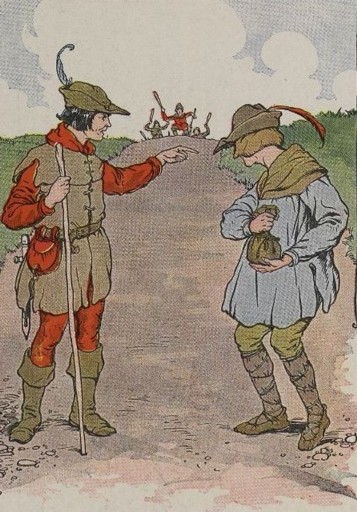| 1. ought | /awt/ |
| -used to say that it is necessary or desirable to perform the action expressed in the verb | |
| I think he ought to apologize to her. | |
| 2. companion | /kuhm-PAN-yuhn/ |
| -a person who is frequently in the company of, associates with, or accompanies another | |
| She has been her mother’s constant companion since she quit her job in New York. | |
| 3. panic | /PAN-ik/ |
| -a sudden overwhelming fear, with or without cause | |
| Panic attacks are irrational and uncontrollable. | |
| 4. stick | /stik/ |
| -to hold fast or adhere resolutely | |
| The accused chose to stick to his fabricated story. | |
| 5. misfortune | /mis-FAWR-chuhn/ |
| -adverse fortune; bad luck. | |
| His misfortunes did not cause his determination to falter. |

“How lucky I am!” he said. “I have found a purse. Judging by its weight it must be full of gold.”
“Do not say ‘I have found a purse,'” said his companion. “Say rather ‘we have found a purse’ and ‘how lucky we are.’ Travelers ought to share alike the fortunes or misfortunes of the road.”
“No, no”, replied the other angrily. “I found it and I am going to keep it.”
Just then they heard a shout of “Stop, thief!” and looking around, saw a mob of people armed with clubs coming down the road. The man who had found the purse fell into a panic.
“We are lost if they find the purse on us”, he cried.
“No, no”, replied the other, “You would not say ‘we’ before, so now stick to your ‘I’. Say ‘I am lost.'”
We cannot expect any one to share our misfortunes unless we are willing to share our good fortune also.
| 1. | How many men were traveling together in the story? |
| 2. | What did one of the travelers say when he found a purse? |
| 3. | How did the same person react when a mob of people accused them of stealing the purse? |
| 1. | How would you describe the characteristics of the traveler who found the purse? |
| 2. | If you were the other traveler, what would you tell the greedy traveler? |
| 3. | If you found a purse full of gold while on a trip, would you share it with your companions? Explain your answer. |
| 4. | The fable’s lesson is “We cannot expect any one to share our misfortunes unless we are willing to share our good fortune also.” Do you agree with this? Why or why not? |
| 5. | Do you share both good times and bad times with your friends? Why or why not? |
| Grammar 文法 |
Pronunciation 発音 | Vocabulary 単語 |
Comprehension 理解 |
|
|---|---|---|---|---|
 GOOD GOOD |
文法の誤りはほとんどなく、完全な文章で話すことができる | ほとんどの単語をはっきりと正しく発音することができる | 習った表現を適切に使うことができる | 文章を理解し、質問に正しく答えることができる |
 FAIR |
文法の誤りはあるが、完全な文章で話すことができる | 発音の練習が必要な言葉がいくつかある | たまにミスはあるが、習った表現を適切に使うことができる | 文章を完全に理解するのは難しく、質問に正しく答えられないときもある |
 POOR |
文章で話すのは難しく、単語だけで話すことができる | 発音の練習が必要である | 習った単語と表現を少しだけ使うことができる | 文章を理解するのは難しく、質問に答えるのは難しい |
An eBook from The Project Gutenberg.
This eBook is for the use of anyone anywhere at no cost and with almost no restrictions whatsoever. You may copy it, give it away or re-use it under the terms of the Project Gutenberg License included with this eBook or online at www.gutenberg.org